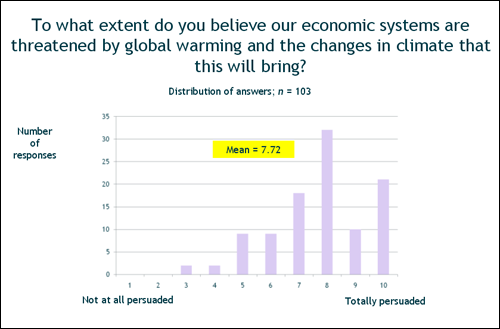Human beings like to avoid significant change wherever possible. Everyone creates and sticks to certain patterns of behaviour – at home, at work, at play. We see this in a trivial yet powerful way every time we run an event: people take a seat and then return to this same chair again and again – even if the meeting runs for 24 hours!
We also tend to be very good at avoidance. When we are told bad things could happen to us, we tell ourselves it can’t be true, or it won’t affect us, or just ignore it. Wartime bombing, seatbelts, smoking, ‘hazardous’ drinking, floods, plastic bags – all are examples where people continue to do things that have a high probability of resulting in harm – to themseles and/or others. We often don’t alter our ways until forcibly made to do so. Sometimes the force for change comes from legislation, sometimes from a groundswell initially created by a very few activists.
The same is true for climate change. How do you *really* feel about it? And what are you *really* going to do about it? Go on, take 2 minutes to think hard about these two questions.
We’re increasingly interested in exploring the facts and implications of climate change – not just for us as individuals but for the clients that we work with. “The economy is a wholly owned subsidiary of the environment, not the other way around." This notable remark from Gaylord Nelson (the former U.S. senator, governor of Wisconsin, and creator of Earth Day - the influential public awareness campaign for global stewardship) suggests a philosophy that, if accepted, would make this issue the single most important factor affective business strategies in the 21st century.
In an attempt to see how widely this view has permeated, we surveyed over 100 MBA students at a global top 10 business school about their hopes, fears and knowledge on sustainable development and climate change (see chart).

The result shows that almost all see the economic systems upon which their lives depend as being threatened by the effects of climate change. But these same students will also know that 5 units of wine (even an exquisite white Burgundy) each day, every day will not be good for them. So will this knowledge lead to changes in behaviour?
We asked them how confident they are that business would respond to the challenges of sustainable development (and if not fully confident, then what it would take to improve their confidence?). They replied with a storm of creative, practical, radical and philosophical arguments to advance ‘green’ business. Few are fundamentalist techno-optimists believing outright that technology alone is the solution – on the contrary many believe that business needs to take the lead and that “business as usual” is no longer a plausible or sustainable option.
For your organisation, public or private, it will be important to think through the threats, your social responsibilities (how best to behave in adapting to the challenges of climate change) but also how to seize the opportunities presented from the rise of interest in climate change and sustainable development in general.
Some companies have already taken this belief to heart – Marks and Spencer, GE Systems and Interface Carpets are considered the leaders in their sectors in putting sustainability at the heart of their strategies and business processes. The stance they have taken also seems to be helping with the reputation their customers hold about them.
Time to think it all through? Or just ignore it and hope for the best?
Join us in Cambridge at 18:00 on Tuesday 8th July or 10:30 Wednesday 9th July with idenk team member and global climate expert, Dr Stephen Peake. We will take a whistle-stop tour of the four main schools of thought about climate change. You will leave with some robust ideas for your business and the value you deliver – to customers, citizens or clients.
Let us know if you would like to reserve a complimentary place at one of these 2 hour pre-holiday seminars.
Ross and Phil at think@idenk.com
If you missed the previous editions of our newsletter, you can find them here.
Sign up for updates on our latest thinking via the Business Briefing